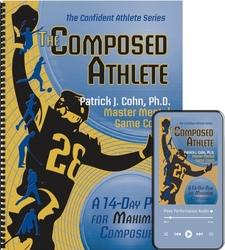
How to Get Past A Loss
After losing a game, do you evaluate your performance, try to erase it from your memory, or stew in negative emotions?
Losses are inevitable in sports. No matter your ability or talent on your team, you will experience losses, whether it’s a buzzer-beater defeat, a missed opportunity, a critical mistake, an off-day, or a blowout.
If you try to block it out, you will miss valuable learning opportunities and athletic growth. When you wallow in self-pity or stew in negative emotions, your confidence will suffer.
What sets successful competitors apart from the rest is their ability to process losses and learn from those moments. Processing a loss objectively and intentionally helps turn temporary pain into long-term gain.
The Minnesota Lynx, who lost in the 2024 WNBA Finals, started the 2025 season with nine consecutive wins. The Lynx dropped their first game of the season to the Seattle Storm, 94-84.
Despite the outcome, Lynx coach Cheryl Reeve downplayed the significance of a single loss. Instead, Reeve remains focused on what is most important, learning and preparing for the next game.
REEVE: “We’re going to do like we always do. We didn’t win a basketball game. We didn’t accomplish the schemes that we were trying to accomplish. We have to get ready for Saturday’s game.”
Likewise, Lynx forward Bridget Carleton highlighted the importance of objectively reviewing the team’s play and improving as a team. Carleton sees this step as crucial if the Lynx are to return to the finals and accomplish their goal of winning a championship.
CARLETON: “Obviously, it’s harder to learn after a loss, but I think it’s a good moment for us to just look inward. They had 50 points in the paint, where we pride ourselves on the defensive end. Things like that just can’t happen if we want to do what we want to do this season, so I think good reminders for us to be better.”
Accomplishing your seasonal goals requires growth and a focus on steady improvement. Processing a loss doesn’t mean minimizing it, blaming others, or obsessing over it.
Rather, processing a loss means using it as a tool for growth. Successful athletes learn from losses so they don’t repeat the same mistakes in future competitions.
Successful athletes take time to reflect, whether internally, with their coach, or with a Mental Game Coach. An objective performance evaluation helps athletes process their emotions, identify positive aspects of their game and parts of their game needing improvement, and helps them reset and prepare for the next competition.
Not only will it help keep your confidence intact, but it will also provide you with a purpose for practice and give you the motivation to achieve your seasonal goals.
6 Steps to Recover from a Loss
Everyone experiences losses in competition. Whether you’re a youth athlete, a college competitor, or a seasoned pro—how you respond matters. If you want to recover from a loss and grow from it, follow these six practical steps.
1. Focus on the Big Picture
One Game. Not Your Career. When emotions run high after a loss, it’s easy to blow things out of proportion. But one bad result doesn’t erase your progress or potential.
Remind yourself: This is just one chapter in a much bigger story.
Zoom Out. Think long-term. Where do you want to go? How does this loss help shape your journey there? Often, the most painful setbacks teach the most valuable lessons.
2. Be Objective
Avoid Harsh Self-Talk. It’s important to be honest, but not cruel. Saying things like “I suck” or “I’ll never win” is not only untrue—it’s damaging.
Look at the facts. What actually happened? What was in your control? Reflect with Purpose
Write down three things that went well, and three things to improve. This balances your perspective and starts shifting you toward action.
3. Separate Your Ability from the Outcome
One Loss ≠ One Identity. A tough performance doesn’t mean you’re a bad athlete. It just means you had a tough day. That’s it. You can have a bad game and still be a good player.
Embrace the Stepping Stone
Use the loss as fuel. Each setback is a setup for a comeback. This mindset is key to recover from a loss with resilience.
4. Solicit Advice
Don’t Go It Alone. Talk to your coach. Ask for feedback from someone you trust. They might see something you’ve missed.
A Mental Performance Coach can help you uncover patterns in your thoughts, emotions, and routines that contributed to the loss.
Stay Curious. Ask: What can I learn? Be open to hearing things that might challenge you. Growth often starts with discomfort.
5. Find the Lessons
Losses are Teachers. Every competition reveals something. Maybe you need to prep differently. Maybe your focus wavered. Maybe nerves took over.
Look for the mental, tactical, and physical takeaways. Ask Yourself:
- What did I learn about myself?
- What would I do differently next time?
- What am I proud of, even in defeat?
6. Recommit to the Process
Build Your Plan. Once the sting fades, shift into action. What small step can you take today to get better? Start with your next practice. Focus on doing the little things well.
Bounce Back Stronger. Athletes who recover from a loss the best are the ones who keep showing up. They don’t let one bad day define them. They use it to sharpen their edge.
Final Thought
Everyone loses a game during the season. No matter what stage you are in your athletic career, learning to effectively and objectively process competition losses is one of the most important mental skills you can develop. What matters is what you do next. Recovering from a loss isn’t about forgetting it—it’s about learning from it and stepping forward with purpose.
Related Sports Psychology Article
- How Pro Athletes Respond After a Team Loss
- How to Deal with an Unexpected Sports Loss
- How Athletes Respond to a Loss
The Composed Athlete (Digital Download)

“The Composed Athlete” audio and workbook program helps you gain a competitive edge by improving your composure in competition. Learn the best ways to let go of mistakes and overcome frustration and dwelling.
“My son Jake has struggled with composure for as long as I can remember. He is doing the Composed Athlete program and is about half-way through. He had the biggest, most stressful wrestling tournament of his season this past weekend. I have never seen him demonstrate such composure and sportsmanship -ever. I was so happy I was fighting back tears. It’s been a long and frustrating road. I am so thankful for your program.”
~Laura Grogan

